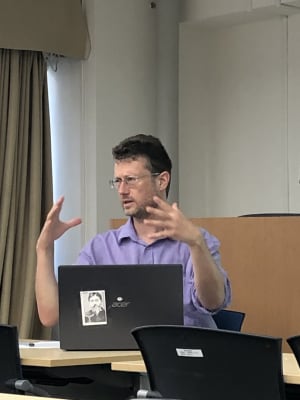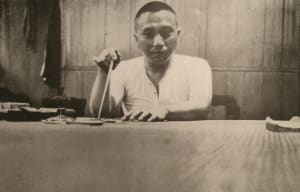News
東文研セミナー「Xavier PAULES先生(フランス社会科学高等研究院)をお迎えして」が開催されました
報告
2024年4月19日と4月25日の2日間にわたって、東文研セミナー「Xavier PAULES先生(EHESS:フランス社会科学高等研究院)をお迎えして」が開催された。本セミナーはEHESSとの協定にもとづき開催されたものである。
1日目は「三段階ゲームと四段階ゲーム—後期帝政期・民国期中国におけるギャンブル・ゲームの類型化の試み」、2日目は「民国期中国への新たな視座―軍閥と華僑の役割の再検討」と題する講演が行われた。両日とも会場には所内外から研究者10名前後が集まり、活発な議論が繰り広げられた。また1日目の講演中には、Xavier Paules先生が四段階ゲームの例として「番攤(fantan)」を実際に披露するなど、大変興味深い研究セミナーとなった。
当日の様子
出典)Maisons de fantan à Macao, Asia, avril 1930(Xavier Paules先生の講演資料より)
開催情報
講演者:Xavier PAULES フランス国立社会科学高等研究院 准教授
講演タイトル・日時:
第1回2024年4月19日(金)14時00分〜15時30分(日本時間)
題目 “Three-step Games versus Four-step Games:
An Attempt at Categorizing the Supply of Gambling Games of Chance in Late Imperial-Republican China”
第2回2024年4月25日(木)14時00分〜15時30分(日本時間)
題目“New insights on Republican China: Reconsidering the Role of Warlords and Overseas Chinese”
会場:東京大学東洋文化研究所 大会議室(3F) *対面のみ
使用言語:英語
総合司会:中島隆博(東洋文化研究所 所長)
要旨:
第1回講演
One might think it obvious or “natural” that all gambling games of chance should follow a three-step sequence, namely: 1) the players bet, 2) the draw takes place, 3) the winnings are distributed. Baccarat, Black Jack, roulette, Boule, slot machines, lotteries, and all the most popular gambling games of chance in the world nowadays indeed follow this sequence. As far as China is concerned, however, this is a misguided assertion. By drawing on a great variety of sources, it is possible to observe that the great majority of Chinese gambling games of chance during the Qing dynasty and up to the middle of the twentieth century actually followed a different pattern. Instead of three steps, the games have four steps in the following sequence: 1) the draw takes place but remains hidden, 2) the players bet, 3) the result of the draw is uncovered, 4/ the winnings are distributed. I will describe the great variety of four-step games and provide tentative explanations for the existence of such a pattern.
第2回講演
In this conference, I will present two of what I consider the most innovative points I make in my recent book The Republic of China, 1912 to 1949 (Cambridge: Polity, 2023). First, I reconsider the role of warlords in connection with the process of state building. I argue that state-building efforts by central authorities were not the only ones significant and worthy of attention. Contrary to the usual depiction of warlords as only concerned with their personal wealth and power, I argue that many had a strong concern for state-building. Warlords’ achievements were impressive, for example, in the realms of transport infrastructure, economic development and education. Second, in terms of cultural circulations, it is a widely shared view that China was under massive Western influence during the Republic. But considerably overlooked is the fact that, at the same period, China exerted a much deeper cultural influence than previously in South-east Asia. I explore the ways overseas Chinese contributed to greatly expend the cultural influence of China. Their dissemination of ways of life and popular culture should lead us to revise our vision of China’s cultural interaction with the rest of the world.
登録種別:研究活動記録
登録日時:FriApr2611:28:312024
登録者 :上田・多田
掲載期間:20240427 - 20240727
当日期間:20240425 - 20240425



